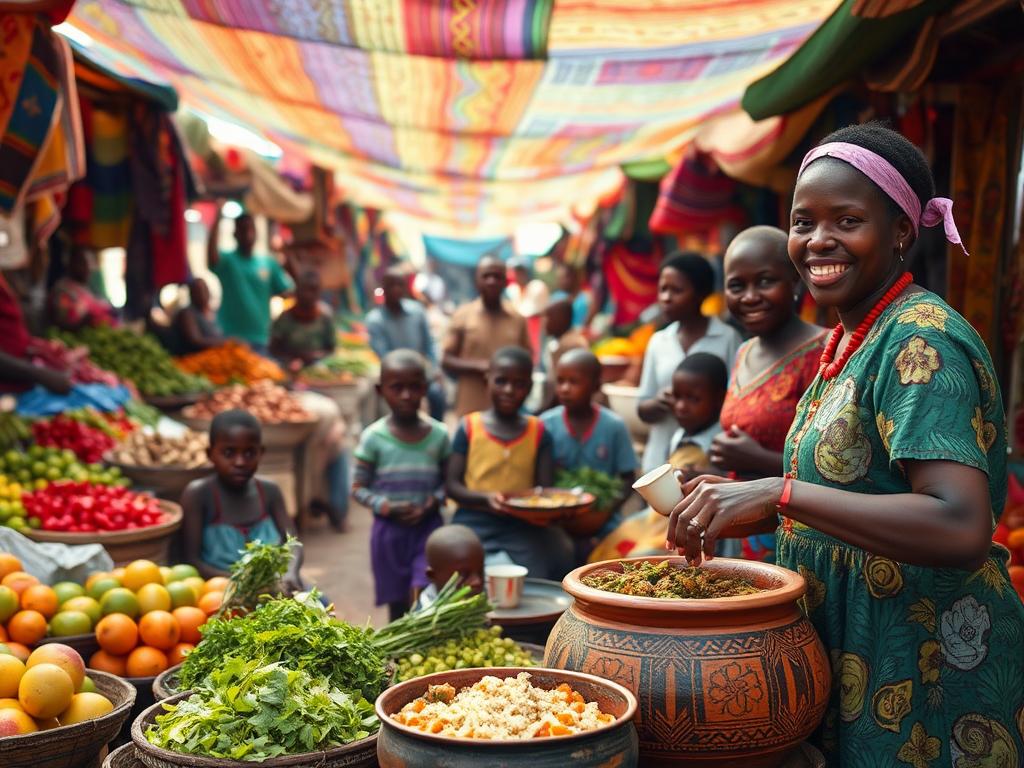
The Role of Food in Kenyan Culture: A Rich Tapestry of Tradition and Identity
The Role of Food in Kenyan Culture: A Rich Tapestry of Tradition and Identity
Introduction
The role of food in Kenyan culture is more than just sustenance; it’s an embodiment of the nation’s diverse heritage and traditions.
This article delves deep into the significance of culinary practices in Kenya, exploring how food unites people, reflects cultural diversity, and plays an essential role in social interactions.
Kenya’s culinary landscape tells stories of the country’s many tribes, with each presenting unique flavors and dishes that celebrate its rich history.
From the staple maize meals that fill plates to the festive occasions that bring families together, food is a vibrant thread woven into the fabric of Kenyan life.
As we journey through various aspects of Kenyan food culture, readers will gain insights into the traditions, beliefs, and practices that shape the country’s gastronomical identity.
Staple Foods That Form the Foundation
Staple foods in Kenya predominantly include ugali, a maize meal that serves as a core part of the diet.
Ugali is not just food; it is a cultural symbol around which meals are centered, connecting families during communal dining experiences.
Other staples include rice, beans, and various vegetables that provide essential nutrition.
In addition, dishes such as sukuma wiki (collard greens) and chapati (flatbread) are enjoyed across the country.
These staples are rich in carbohydrates and often served with protein sources like fish, chicken, or goat meat, providing a balanced and wholesome diet.
According to the Kenya National Bureau of Statistics, maize is cultivated in over 80% of rural households, highlighting its critical importance in local diets.
Regional Diversity in Culinary Traditions
Kenya is a melting pot of cultures, with distinct cuisines rooted in its various regions.
For instance, the coastal region boasts a plethora of flavorful seafood dishes influenced by Swahili culture, such as biryani and samaki wa kupaka (grilled fish with coconut sauce).
Meanwhile, the Central Highlands are known for nyama choma (grilled meat), often shared at gatherings and celebrations.
Each region’s geography plays a vital role in determining what ingredients are available, thus influencing the dishes created.
This regional diversity reflects the myriad of ethnic groups within Kenya and their culinary practices, making food a powerful marker of identity and belonging.
Celebrations and Food: A Cultural Connection
In Kenya, food plays an integral role in cultural celebrations and rituals.
Whether it’s a wedding feast, a funeral gathering, or a harvest festival, food is central to these communal events.
During weddings, traditional dishes like kikuyu’s irio (mashed potatoes, peas, and corn) and chicken stew are must-haves.
These gatherings exemplify the Kenyan spirit of hospitality and the importance of sharing food.
In many communities, food symbolizes abundance and prosperity, with certain dishes reserved for special occasions.
A local proverb states, “A meal shared is a bond created,” emphasizing the communal aspect arising from sharing meals during celebrations.
Ethnic Influences on Kenyan Cuisine
Kenya’s food culture owes much to its ethnic diversity, with over 40 distinct tribes each bringing unique flavors to the culinary table.
The Kikuyu, for instance, are well-known for their delicious nyama choma, while the Swahili express their coastal heritage through flavorful spices and dishes like biryani.
This ethnic interplay enriches Kenyan cuisine, blending different cooking methods and ingredients.
Notably, many popular dishes today have roots in historic interactions, such as the influence of Indian spices introduced through trade.
As culinary artist and author, Ali M. K. expresses, “Food is an art form that reflects cultural identity.”
Every meal thus tells a story shaped by generations of tradition and adaptation.
The Vibrant Street Food Scene
Kenya’s urban areas are characterized by bustling street food scenes that contribute to the local food culture.
Street vendors serve delicious snacks like samosas, mandazi (fried dough), and bhajis, drawing locals and tourists alike.
Street food culture is not just about convenience but also about community — it fosters social interactions among strangers and friends alike.
Popular street food hubs, particularly in cities like Nairobi and Mombasa, create a sense of belonging, allowing people to bond over their shared love for these portable delicacies.
Sampling street food is an essential experience for anyone visiting Kenya, showcasing the bustling vibrancy of the country’s urban food culture.
The Significance of Tea and Coffee
Tea and coffee remain pivotal elements of Kenyan culture, not only as beverages but as symbols of social connection.
Kenya is renowned globally for its high-quality tea and coffee, and agricultural production plays a vital role in the economy.
When visiting a Kenyan home, the warm invitation for chai (tea) is a sign of hospitality and respect.
It brings together family members and friends to share stories and laughter, often accompanied by local snacks.
In contrast, coffee holds a cultural significance in ceremonies and celebrations, representing hard work and community ties.
Additionally, coffee farms offer tours to visitors interested in understanding the cultivation and processing of these beloved beverages.
Nutrition and Health in Traditional Diets
As health consciousness increases globally, traditional Kenyan diets, which focus on whole, unprocessed foods, are gaining recognition for their health benefits.
Kenyan cuisine emphasizes fresh local ingredients, including a variety of fruits, vegetables, legumes, and whole grains.
Research shows that a diet rich in these foods contributes to reducing the risk of chronic diseases.
Moreover, the preparation methods used in traditional cooking, such as steaming and boiling, help preserve vital nutrients.
Education on nutritional practices rooted in Kenyan culture is essential for promoting healthy eating habits among younger generations.
The Role of Food in Religious Practices
Food is central to many religious practices and observances in Kenya, carrying spiritual significance across various communities.
For instance, during Ramadan, Muslims engage in fasting from dawn to sunset, culminating in special meals during Iftar.
These gatherings offer an opportunity for community connection and reflection.
Additionally, among Christians, certain dishes are prepared during Easter celebrations, symbolizing renewal and hope.
Food rituals often serve as reminders of cultural beliefs, values, and traditions, intertwining culinary and spiritual practices.
Globalization and Modern Influences
In recent years, globalization has transformed the culinary landscape in Kenya, introducing international cuisines alongside traditional dishes.
Many Kenyans enjoy fast food options, recognizing global influences such as burgers, pizzas, and sushi.
While modernity brings variety, it is critical to maintain a balance between embracing new trends and preserving traditional culinary practices.
Interestingly, the ongoing emergence of food fusion has led to creative dining experiences in restaurants where local ingredients meet international flavors.
This culinary evolution represents the adaptability of Kenyan food culture in an increasingly interconnected world.
Conclusion
The role of food in Kenyan culture is undeniably rich, diverse, and multifaceted.
From its foundational staples to communal celebrations that bring people together, food embodies the essence of Kenya’s vibrant identity.
The blending of ethnic traditions, seasonal ingredients, and religious practices further highlights the profound connection between food and culture.
As Kenya continues to evolve in the face of globalization, it remains crucial for communities to cherish and uphold their culinary heritage.
This appreciation not only nurtures health and well-being but also preserves the stories and legacies that define Kenya’s cultural landscape.
As we relish the abundance of flavors that Kenyan cuisine has to offer, let us advocate for sustainable practices that promote both traditional values and modern influences.
FAQs
1. What are the most common staple foods in Kenya?
Most common staple foods in Kenya include ugali (maize meal), rice, beans, chapati, and various vegetables.
These staples play a crucial role in the daily diet of Kenyans.
2. How do celebrations influence food culture in Kenya?
In Kenya, celebrations such as weddings and harvest festivals prominently feature traditional dishes that symbolize unity and prosperity.
Food serves as an essential component of community bonding during such occasions.
3. What is the significance of tea and coffee in Kenyan culture?
Tea and coffee are vital social beverages in Kenya, representing warmth and hospitality, especially during gatherings.
Additionally, Kenya is renowned for its quality coffee production, contributing to the economy.
4. How is Kenyan cuisine impacted by its diverse ethnic groups?
Kenya’s diverse ethnic groups each contribute unique dishes and cooking techniques, reflecting the country’s rich cultural tapestry.
This diversity shapes the national cuisine, making it a reflection of its multifaceted society.
5. What role do street foods play in Kenyan food culture?
Street food in Kenya serves as a vibrant aspect of urban culture, promoting social interactions and providing affordable, delicious meal options.
It is a reflection of the local culinary scene, showcasing popular snacks enjoyed by both locals and tourists.
6. Are traditional Kenyan diets considered healthy?
Yes, traditional Kenyan diets focus on whole, unprocessed foods that are rich in nutrients, promoting health and well-being.
These diets can help reduce the risk of chronic diseases when balanced appropriately.
7. What is the influence of globalization on Kenyan cuisine?
Globalization has introduced a variety of international cuisines to Kenya, blending with local culinary practices.
While this diversity brings new experiences, it is essential to preserve traditional food customs.
8. How does food play a role in religious practices in Kenya?
Food carries spiritual significance in many Kenyan religious practices, often being central to ceremonies and observances.
Sharing meals during religious events promotes community bonding and cultural identity.
9. How can people explore Kenyan food culture?
People can explore Kenyan food culture through culinary tourism, local cooking classes, and visiting markets.
Engaging with local chefs and communities provides authentic experiences of traditional cuisine.
10. Why is it important to preserve traditional cooking practices in Kenya?
Preserving traditional cooking practices helps maintain cultural heritage and keeps alive the historical narratives tied to food.
It fosters community connections, promotes local ingredients, and encourages sustainable food practices.
Please share your thoughts or experiences in the comments section below.
Food is not only vital for sustenance; it also connects us to our roots, traditions, and communities.





